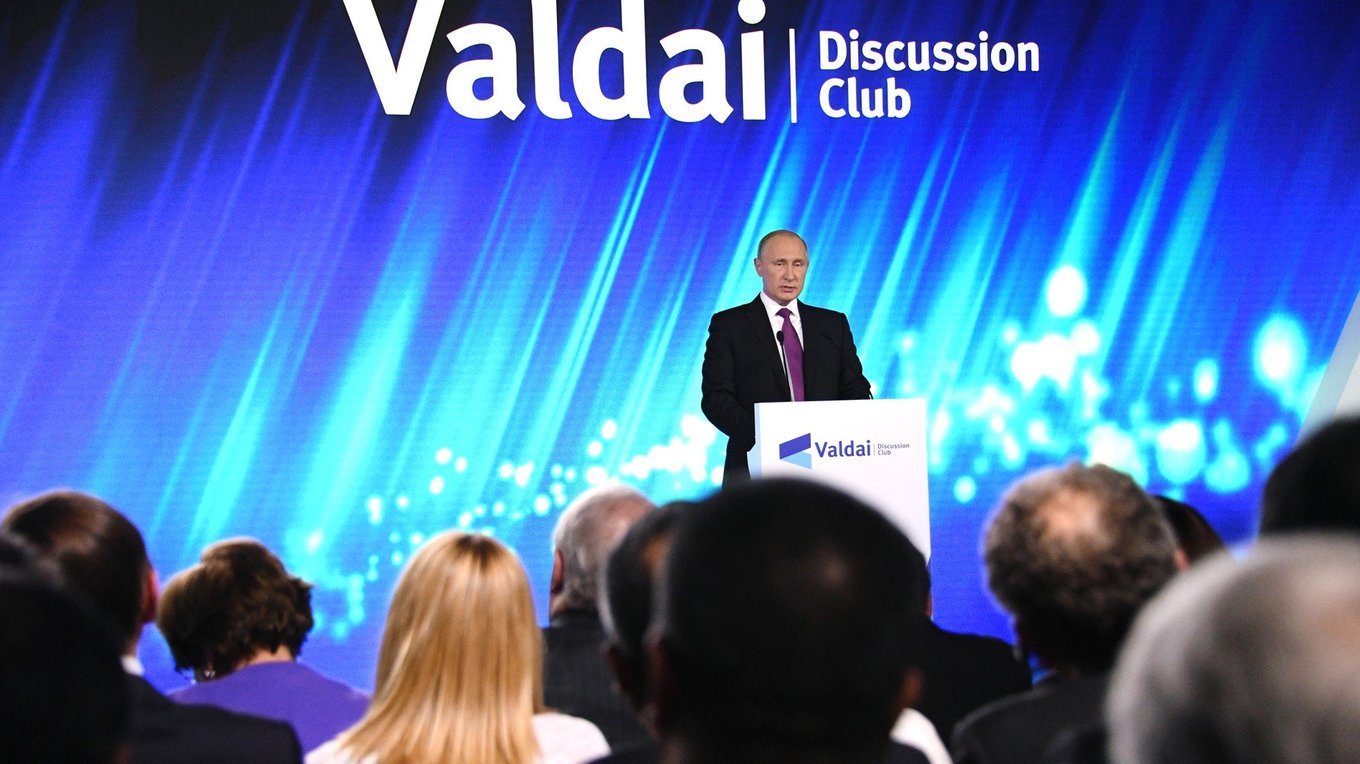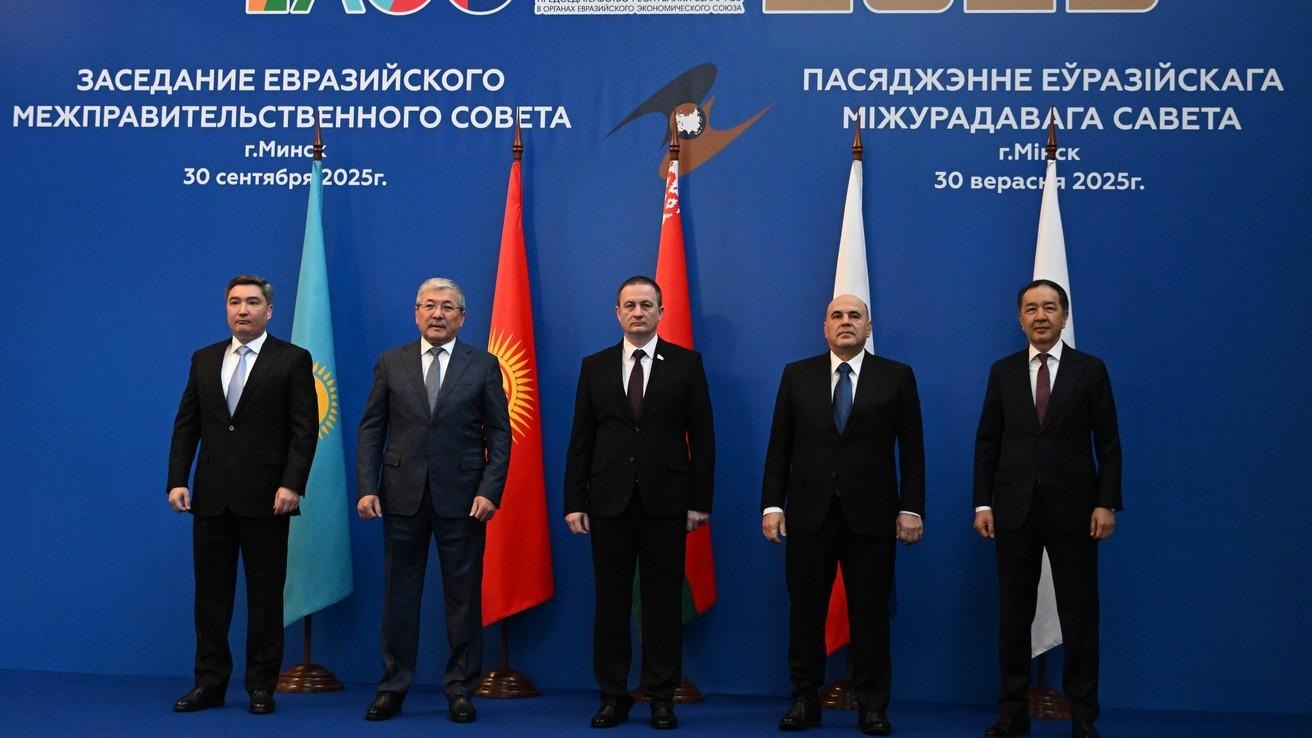
Putin Hosts Another Valdai to Draw Attention Away From Russia’s Stagnation
Putin Hosts Another Valdai to Draw Attention Away From Russia’s Stagnation
The annual meeting of the Valdai discussion club provides a unique opportunity for many Western experts to “meet” with President Vladimir Putin. This year, the Kremlin sought to build up expectations by divulging that Putin was working on a draft of a particularly important speech (RIA Novosti, October 13). However, the Russian president’s performance turned out to be distinguished only by his demonstrative lack of interest in the proceedings (Kommersant, October 20). He recycled a number of clichéd observations about the growing challenges to the global order, stated that the United Nations needed reforms on the basis of broad consensus, and expressed a preference for gradual evolution rather than revolution (Nezavisimaya Gazeta, October 19). The absence of any meaningful content would have been noteworthy were it not so typical of the way Putin has behaved for months, in the course of his yet-to-be-announced campaign for a fourth term as president of the Russian Federation (New Times, October 20).
The clearest impression coming out of Putin’s three-hour-long Valdai appearance was his disappointment in and anxiety about Russia’s relations with United States. He blamed the US for fostering chaos in the Middle East, complained about insufficient attention being paid in Washington to Moscow’s interests, and hinted that the US administration was too rude to North Korea’s dictator, Kim Jong-un (Gazeta.ru, October 19). Furthermore, he suggested Europe was following the United States’ lead too loyally and argued that US sanctions against Russia were aimed at carving out a niche in the European Union market for US liquefied natural gas (LNG) producers (RBC, October 19). Characteristically, he refrained from any criticism of US President Donald Trump and refused to follow up when such critical opinions were ventured by certain Valdai experts (New Times, October 20). He stuck to the flat denials of any Russian interference in the 2016 US elections and expressed his apparent expectations that the investigations in Washington would blow over sooner or later, finally making it possible for Trump to return to the initial plan of striking a deal with Moscow.
This ambivalence was particularly pronounced in Putin’s discourse on arms control, which had a prominent place in his presentation though featured remarkably limited content. He praised Russia’s achievement in eliminating all stocks of chemical weapons (without mentioning US investments in this program); confirmed Moscow’s commitment to nuclear disarmament, while stating that “conditions” were not favorable for any practical steps in this direction; and asserted Russia’s strict adherence to the 1988 Intermediate-Range Nuclear Forces (INF) treaty and its readiness to respond to a possible US withdrawal from this bilateral legal agreement (Novaya Gazeta, October 21). The program for modernizing Russia’s Iskander tactical ballistic missile system is progressing fast, in direct violation of INF provisions; therefore, Washington’s option to unilaterally withdraw from the Treaty due to Russia’s blatant violations is becoming increasingly more plausible (Gazeta.ru, October 19). Foreign Minister Sergei Lavrov put the blame for the deadlock in advancing the non-proliferation agenda squarely on the US Congress, which, according to him, has worked itself into a “Russo-phobic rage.” But in fact, it is Russia’s massive program of modernization of its nuclear arsenal that directly undermines Moscow’s proclaimed commitment to non-proliferation (Kommersant, October 21; Nezavisimaya Gazeta, October 19).
Putin’s paucity in conceptualizing the dynamics of global affairs stands in stark contrast with the rich supply of new assumptions and guidelines coming out of the 19th Congress of the Communist Party, in Beijing (Rosbalt, October 20). The organizers of the Valdai show were aware of the greater resonance of Chinese President (as well as Secretary General) Xi Jinping’s opening speech, but hoped that Putin would nevertheless deliver one of his trademark surprises (Russiancouncil.ru, October 20). None happened, and Putin’s grievance-filled speech illustrated the undeniable difference between a declining Russia and a China firmly set to continue going strong. It has also become apparent that, with all the talk about the two countries’ strategic partnership, the Kremlin actually has no clue about what is happening in Beijing (Kommersant, October 19). Experts speculate about the growing similarity in the style of leadership of these two authoritarian rulers, but it is clear that Xi’s fierce campaign against corruption remains foreign and utterly incomprehensible for Putin’s highly corrupt court (Vedomosti, October 15).
Both Putin and Xi seek to position themselves as experienced and wise statesmen, steering their respective states through the turbulent currents of global affairs (Republic.ru, October 20). The latter builds this image on an impressive list of achievements, from his trademark Belt and Road Initiative to China’s sustained economic growth; whereas, the former boasts about Russia’s “victory” in Syria and promises economic revival, even if official data describes deepening stagnation (Rosbalt, October 20). Xi has found a way to make himself an indispensable partner for Trump in isolating the maverick North Korean dictator, while Putin has positioned himself as the main antagonist to US leadership on the international arena and the champion of rebels of various persuasions, from Venezuela to Zambia to Iran. Xi is consolidating his control over Chinese politics, while Putin has discovered that accumulating too much executive power amounts to having no control over his own court—making the forthcoming Russian presidential elections a cheap farce (Grani.ru, October 19).
Putin is still looking for the fateful moment to announce his decision to claim yet another presidential term (the Valdai crowd was disappointed with his refusal to commit). But at this point, the suspense is long gone, and clearly neither he nor his country have much of a choice in front of them. Stepping aside is not an option for the accidental autocrat since, once out of power, he would have to answer for a long litany of serious blunders and abuse of power. At the same time, saying “No” is also not an option for an electorate that had rejoiced over the forcible annexation of Ukraine’s Crimea and largely shrugged off the murder of opposition politician Boris Nemtsov. Putin has become entirely predictable in keeping Russia on the steady course of decline, and he counts on broad public consent to keep his hand on the wheel. This “harmony,” however, is set to be broken as global dynamics offer Russia little chance to sink quietly into the quagmire of Putinism. The unchangeable leader has to respond to new challenges—from tightening US sanctions to terrorist attacks—and his ill-considered responses could make him the most dangerous maverick in the world.


